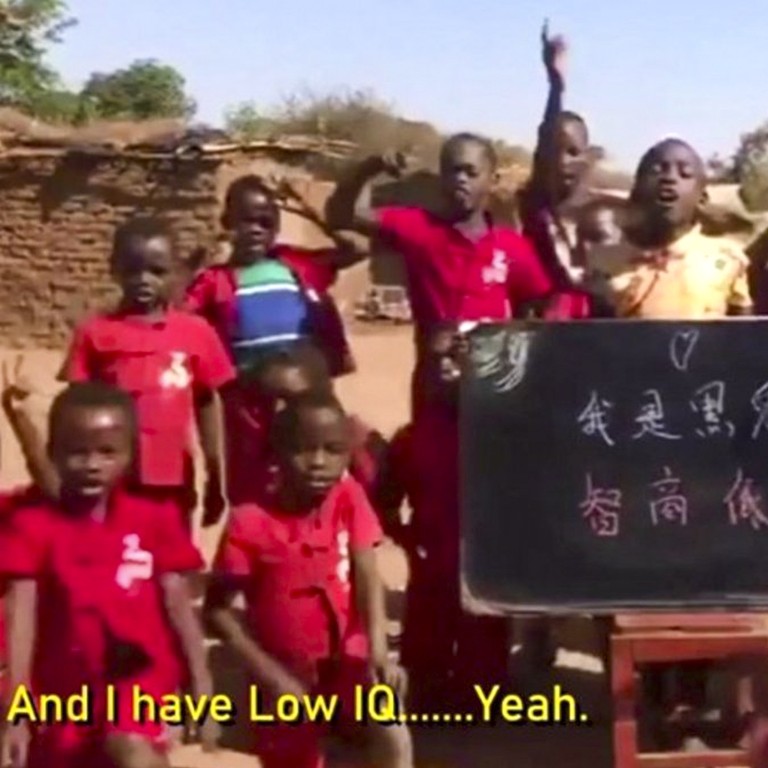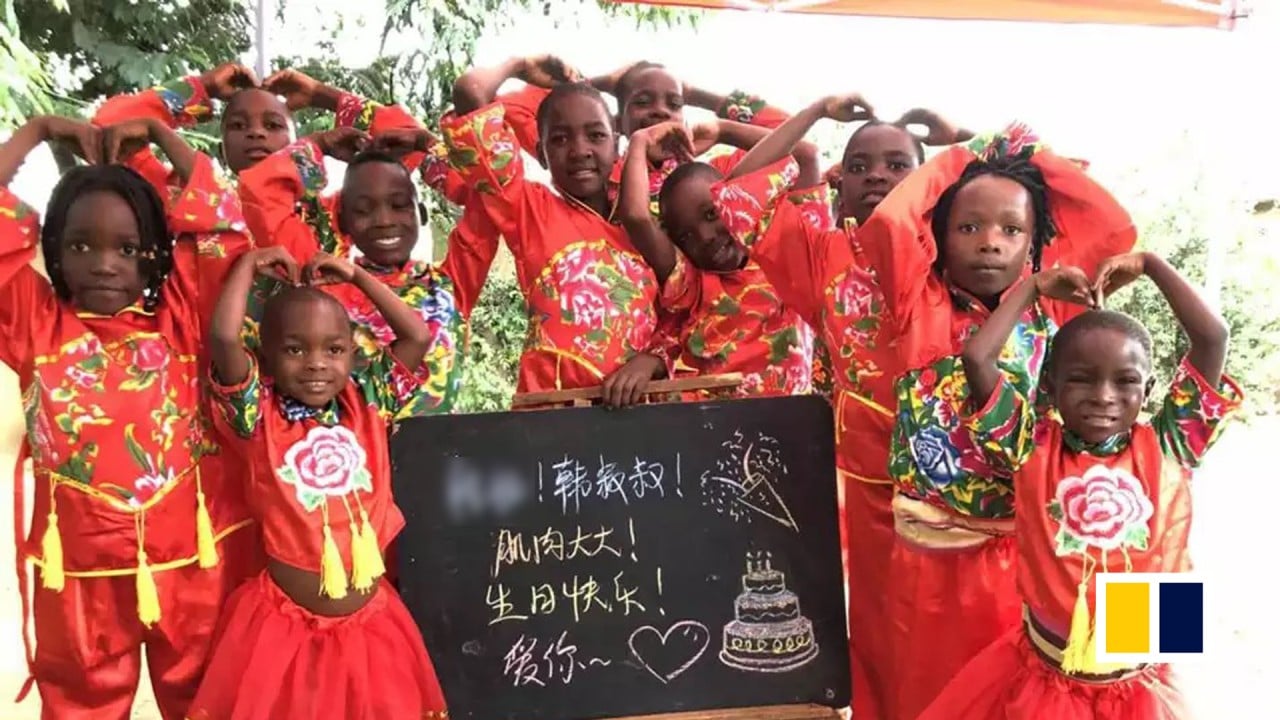
China vows to crack down on online racism, spurred by new details of video featuring Malawi children
- Malawian foreign minister says her country feels ‘disgusted, disrespected and deeply pained’ by video in which children repeat demeaning words in Chinese
- European academic says Beijing is wise to take this seriously now while it harms China’s image abroad
A BBC investigation aired early this week found that a video in which a group of children are being told to chant phrases in Chinese was shot in Malawi by Chinese national Lu Ke, who allegedly takes hundreds of videos a day to sell.
In the video, the children are told to repeat the words: “I am a black monster and my IQ is low”.
The children, who are allegedly paid half a dollar a day, sing and chant without realising the words are offensive. The video caused outrage across the world in 2020 when it was published online but it had not been established where it was shot.
On a visit to Malawi on Tuesday, Wu Peng, director general of the Chinese foreign ministry’s African affairs department, said he had reached an agreement with the Malawian foreign minister that both countries have zero tolerance of racism.
“China has been cracking down on those unlawful online acts in the past years. We will continue to crack down on such racial discrimination videos in the future,” Wu said.
Wu is in Malawi as part of an African tour in which he has visited South Africa and is set to visit Tanzania, Senegal, Burkina Faso and Togo “to deepen friendly exchange and practical cooperation” between China and African countries.
The Chinese embassy in Malawi also said it had noted the BBC’s “Racism for Sale” report on social media with great concern.
“We strongly condemn racism in any form, by anyone or happening anywhere,” the embassy said. “We also noted that the video was shot in 2020. In the past years, China has been cracking down on such unlawful online acts and achieved tangible results. We will work with the Malawi side and see to it that this issue is properly addressed.”
Lights, camera, traction: Chinese live-streamers show diplomats new channel
There has been outrage over the video in Malawi and beyond.
Nancy Tembo, Minister of Foreign Affairs of Malawi, said of the video that had circulated on social media in recent days, adding: “We are feeling disgusted, disrespected and deeply pained.”
“It has offended us as a government – for people to sit down and plan to insult and disrespect us as a nation,” she said.
The BBC Africa Eye investigation traced the location of the video to Njewa, a district in the capital Lilongwe.
The Malawian police have since launched an investigation. National Police deputy spokesman Harry Namwaza said police had noted issues of child exploitation in the video and were investigating further.
“We are following all legal processes. As police, we are supposed to investigate where we feel that a crime has been committed. There are so many issues in the videos and we will use the content to find our case,” he said.
Barry Sautman, a political scientist at Hong Kong University of Science and Technology, said: “Any videomaking that involves people being paid to say something they don’t understand arguably … presents a moral hazard, which might include incitement to racial discrimination.”
Sautman said articles in China’s criminal code provided for penalties for inciting racial discrimination, in speech or a publication. It had been applied to cases involving Han Chinese who had committed ethnically discriminatory acts against minorities and had resulted in prison sentences, he said.
He said states were obliged to prohibit such acts under the UN Convention for the Elimination of All Forms of Racial Discrimination.
“Most countries and territories have created domestic laws to criminalise incitement to racial discrimination, although the US is a notable exception,” Sautman said.
“Hong Kong has such a law, but as far as I know, it has not been applied, despite discrimination being far from rare here.”
He said international law allowed some criminal offences to be subject to extraterritorial jurisdiction and, in the instance of the Malawi video, there was a clear basis for such jurisdiction, as the company and the customer were likely to be based in China.
“We shall see if China will prosecute in this case, but my view is that the Chinese government should do so in this and every instance, no matter where the activity arises. It should also publicise such prosecutions,” Sautman noted.
Sautman said the industry that created videos featuring Africans that went on sale in China was not large.
“For the most part, it has not involved racism, as commonly conceived. The videos typically involve someone paying a company to pay African children to make a birthday or other greeting in Chinese, which is sent to someone in China,” he said.
“The racist video made in Malawi is the first of that kind I’ve heard of, but there likely are others, given China’s huge population and well-developed videography industry.”
Chinese internet users upset by ‘shady’ videos of African kids
Stephen Chan, professor of politics and international relations at the School of Oriental and African Studies in London, said that “the completely vulgar nature of these videos took even the Chinese authorities by surprise”.
He said racist videos of this sort were not as yet a big industry; but “there does seem to be a niche market in China which, because so long cut off from the rest of the world, has racist attitudes – believe it or not – even against white people”.
“However, I would not be surprised if the Chinese police and courts did not try to make an example out of the makers of these particular videos.”
Heidi Haugen, professor of China studies at the department of culture studies and Oriental languages at the University of Oslo, said the Chinese government had not done enough to crack down on the videos since Chinese censorship apparatus knew about them for years. They had been suppressed in the past on some platforms, only to crop up on other platforms.
“If the political resolve is there, offensive content is removed from all platforms, permanently. The Weibo account with these videos was devoted solely to racist jokes, it was easily identifiable,” Haugen said. “But cracking down on such offensive videos has not been a priority.”
Haugen said the foreign ministry was wise to take this seriously now while it severely harmed China’s image abroad.
“Most Chinese have no personal interaction with black people. This makes it harder to identify and push back at dehumanising representations like this video. Racist representations also harm Chinese people with black friends, business partners or family members,” Haugen said.
“Suppressing content is not enough to change people’s image of Africa. Public representations of Africa are dominated by poverty and wildlife. Many Chinese do not see Africans as architects, scientists or managers. These stories need to be told, otherwise people retain a very lopsided image of Africa and Africans. With proper resources, there are many Chinese journalists and writers who could tell these stories well.”


